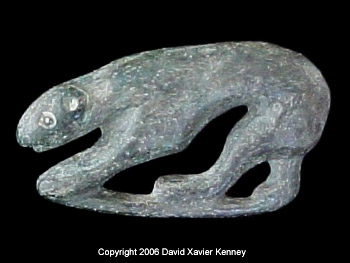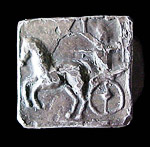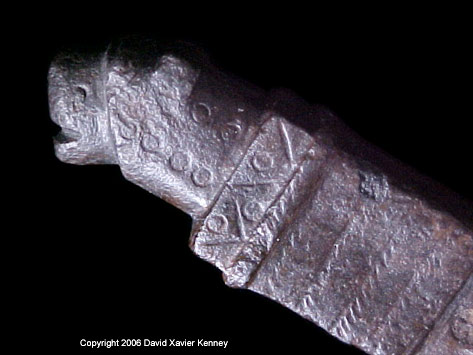


Notice: This is the official website of the All Empires History Community (Reg. 10 Feb 2002)
Does "King Arthur" really EXIST?? |
Post Reply 
|
Page <123> |
| Author | |||||
Cyrus Shahmiri 
Administrator 

King of Kings Joined: 07-Aug-2004 Location: Iran Online Status: Offline Posts: 6240 |
 Quote Quote  Reply Reply
 Topic: Does "King Arthur" really EXIST?? Topic: Does "King Arthur" really EXIST??Posted: 02-Jul-2008 at 20:36 |
||||
|
There were also some great Persian kings with the name of "Bear", for example we have Arsames, the grandfather of Darius the Great, but it derives from Old Persian "Arsa", Avestan "Arsha" not "Arth". Proto-IE: *rtk'- <PIH *H->
Nostratic etymology:
|
|||||

|
|||||
 |
|||||
Slayertplsko 
Chieftain 
Joined: 13-May-2008 Location: Slovakia Online Status: Offline Posts: 1061 |
 Quote Quote  Reply Reply
 Posted: 02-Jul-2008 at 20:43 Posted: 02-Jul-2008 at 20:43 |
||||
|
Cyrus, if you're..forbid that thought..trying to prove that Germans are Iranians, I think it would be more appropriate to tempt the fate in 'Saxon and Scythian' or 'Is Germanic subgroup of Iranian?'...I'm still waiting for your answer there.
|
|||||
 |
|||||
Slayertplsko 
Chieftain 
Joined: 13-May-2008 Location: Slovakia Online Status: Offline Posts: 1061 |
 Quote Quote  Reply Reply
 Posted: 02-Jul-2008 at 20:45 Posted: 02-Jul-2008 at 20:45 |
||||
Wait a minute...Scythian isn't Iranian language?? We could do with a little reference for the Scythian 'plow', and Persian 'prow'. |
|||||
 |
|||||
Cyrus Shahmiri 
Administrator 

King of Kings Joined: 07-Aug-2004 Location: Iran Online Status: Offline Posts: 6240 |
 Quote Quote  Reply Reply
 Posted: 02-Jul-2008 at 21:00 Posted: 02-Jul-2008 at 21:00 |
||||
|
As you read in the link that I gave about Iranian Arta/Artor and Armenian Arda, Old Persian "Arta" originaly meant "Order" (Oxfor Dictionary -> Order: a state in which the laws and rules regulating public behaviour are observed.), English "Order" is said to be a loan word from Latin, what could be the original English/Germanic word? From Grimm's law (also known as the First Germanic Sound Shift):
|
|||||

|
|||||
 |
|||||
Vorian 
Colonel 
Joined: 06-Dec-2007 Location: Greece/Hellas Online Status: Offline Posts: 566 |
 Quote Quote  Reply Reply
 Posted: 02-Jul-2008 at 21:52 Posted: 02-Jul-2008 at 21:52 |
||||
|
Why is this thread turning to another glossological pissing contest? You guys make us Balkans proud.
All the similarities between Persian and European languagesare due to the fact that Greek and Latin have the same roots with Persian (Indo-Europeans ring a bell) and those two (especially Latin) influenced greatly French which in turn influenced German and English. |
|||||
 |
|||||
Aelfgifu 
Caliph 

Joined: 25-Jun-2006 Location: Netherlands Online Status: Offline Posts: 3387 |
 Quote Quote  Reply Reply
 Posted: 02-Jul-2008 at 22:14 Posted: 02-Jul-2008 at 22:14 |
||||
|
German is a separate branch of Indo-European. It does not derive from French. Almost all French influence on German dates to post-medieval times, mainly though the Hugenots.
|
|||||

Women hold their councils of war in kitchens: the knives are there, and the cups of coffee, and the towels to dry the tears. |
|||||
 |
|||||
Vorian 
Colonel 
Joined: 06-Dec-2007 Location: Greece/Hellas Online Status: Offline Posts: 566 |
 Quote Quote  Reply Reply
 Posted: 02-Jul-2008 at 22:28 Posted: 02-Jul-2008 at 22:28 |
||||
|
You get my point.
|
|||||
 |
|||||
Cyrus Shahmiri 
Administrator 

King of Kings Joined: 07-Aug-2004 Location: Iran Online Status: Offline Posts: 6240 |
 Quote Quote  Reply Reply
 Posted: 03-Jul-2008 at 08:29 Posted: 03-Jul-2008 at 08:29 |
||||
|
There is a possibility that "Arthur" was just the Welsh name of Persian "Baraz" (the famous Sassanid spahbod) or Sarmatian "Batraz", this word could mean both "Boar" and "Bear" in the Iranian languages. More info about Sarmatian Batraz: http://en.wikipedia.org/wiki/Batraz Batraz was the leader and greatest warrior of the mythical super-human race, the Narts. The Narts were the central figures of Sarmatian folklore. The character of Batraz may be connected to King Arthur.
[edit] The NartsThe mother of the Narts was Satana who was renowned for her wisdom. The principal enemies of the Narts were the Terks or Turks but they also fought the vaigs, man eating ogres, and would ultimately do battle with heaven itself. Nart heroes include Soslan, Atsamaz, Hamytz and Uryzmag. The Narts had a great hall called Nykhas where they would feast and drink. [edit] The life of BatrazThe Sarmatians shared an almost spiritual connection with their weapons, and so the life of Batraz revolves around his magic sword. While a young man, Batraz pulls his sword from the roots of a tree. This could be connected to the fact that Sarmatians were buried with their swords embedded in the earth or stone at the heads of their graves. Also the sword of Batraz plays an important part of his death, when he is fatally wounded by his archenemy, Sainag-Alder. Legend has it that Batraz tells his friend to throw his sword into the ocean. The warrior is reluctant at first, not only because of the quality of the sword but because of the spiritual connection it had with Batraz. But in the end the warrior did throw the sword and it was caught by a water goddess. [edit] Concerning Batraz and King ArthurIt was recently noticed that Batraz and the legendary King Arthur share many similarities. Batraz has a magical sword that is cast into the ocean (probably the Black Sea) as he dies; in Arthurian myth, as Arthur is dying from the wounds his archenemy Mordred has inflicted on him, he calls his knight Bedivere to throw his sword Excalibur into a lake, where it was caught by the Lady of the Lake. It has been suggested that Arthur was based on Lucius Artorius Castus, a Roman general who led an elite cavalry unit in Britain. The cavalry was made up of heavy Sarmatian horsemen. Artorius (a possible Latin origin of the name Arthur) may have contributed to the character. Although Artorius left Britain his retired Asian knights stayed and possibly spread the stories of Batraz to the Celto-Roman population. |
|||||

|
|||||
 |
|||||
Cyrus Shahmiri 
Administrator 

King of Kings Joined: 07-Aug-2004 Location: Iran Online Status: Offline Posts: 6240 |
 Quote Quote  Reply Reply
 Posted: 03-Jul-2008 at 08:44 Posted: 03-Jul-2008 at 08:44 |
||||
|
It is interesting to read it: http://www.kingarthurbanner.com/artifacts.htm#saxonthunderer
Saxon Ring Of Arthur As The Scythian Navigator, Thunderer, and War god - Bear Artifact Group 2
 |
|||||

|
|||||
 |
|||||
Slayertplsko 
Chieftain 
Joined: 13-May-2008 Location: Slovakia Online Status: Offline Posts: 1061 |
 Quote Quote  Reply Reply
 Posted: 03-Jul-2008 at 09:48 Posted: 03-Jul-2008 at 09:48 |
||||
Cyrus, once again. Order entered English in high middle ages. You can't find the original Germanic word by simply subject it to Grimm's law! How can you eve think so? Come on.  |
|||||
 |
|||||
Slayertplsko 
Chieftain 
Joined: 13-May-2008 Location: Slovakia Online Status: Offline Posts: 1061 |
 Quote Quote  Reply Reply
 Posted: 03-Jul-2008 at 10:10 Posted: 03-Jul-2008 at 10:10 |
||||
|
Why in all the threads you enter do you pick some nation and are trying to prove they have Scythian/Iranian/Persian origin?? It's highly suspicious eve at this level.
|
|||||
 |
|||||
Cyrus Shahmiri 
Administrator 

King of Kings Joined: 07-Aug-2004 Location: Iran Online Status: Offline Posts: 6240 |
 Quote Quote  Reply Reply
 Posted: 03-Jul-2008 at 10:49 Posted: 03-Jul-2008 at 10:49 |
||||
|
I just talk about the relations between Germanic and Iranian peoples, is it Forbidden? Is it just me who connect King Arthur with Sarmatians? There are hundreds articles and books written about it, for example read this one: http://www.jstor.org/pss/1259982 
The problem is that you just don't want to believe the facts! |
|||||

|
|||||
 |
|||||
Slayertplsko 
Chieftain 
Joined: 13-May-2008 Location: Slovakia Online Status: Offline Posts: 1061 |
 Quote Quote  Reply Reply
 Posted: 03-Jul-2008 at 10:54 Posted: 03-Jul-2008 at 10:54 |
||||
|
But it is just you who say Germanics are descendants of Iranians, Slavs are descendants of Iranians, Saxons only, Dutch only, English only...and it changes.
|
|||||
 |
|||||
Slayertplsko 
Chieftain 
Joined: 13-May-2008 Location: Slovakia Online Status: Offline Posts: 1061 |
 Quote Quote  Reply Reply
 Posted: 03-Jul-2008 at 10:56 Posted: 03-Jul-2008 at 10:56 |
||||
And don't rely on sources...we've been through this - we all know that it's you who don't want to believe facts and refuse to rely on sources unless it adds to your agenda. I'm still waiting in Ir-Ger thread for your answers....facts & sources...come on, show me  |
|||||
 |
|||||
Styrbiorn 
Caliph 
Joined: 04-Aug-2004 Online Status: Offline Posts: 2810 |
 Quote Quote  Reply Reply
 Posted: 03-Jul-2008 at 10:59 Posted: 03-Jul-2008 at 10:59 |
||||
You call myths, folklore and traditions "facts"? Just for the record, the Britons weren't Germanic Cyrus. |
|||||
 |
|||||
Joinville 
Consul 
Joined: 29-Sep-2006 Location: Sweden Online Status: Offline Posts: 353 |
 Quote Quote  Reply Reply
 Posted: 03-Jul-2008 at 13:29 Posted: 03-Jul-2008 at 13:29 |
||||
|
It's overwhelmingly possible that there never was an historical "king Arthur".
The hypothesis based on an ortographic similarity between "Arthur" and a Roman cavalry commander known to have served in Britian is curious, but it's 1) entirely impossible to prove he had anything to do with the Arthur figure, and 2) it's extremely unlikely he did. Maybe there was another Roman commander, or a dozen, with a curious name somewhat like "Arthur" who did, but not this guy? But we'll never know, the link is enirtely conjectural. What's known is that there is no mention of Arthur in Welsh accounts before Nennius, 9th c., putting him a couple of centuries before that time. And then Arthur springs fully formed into human immagination in the 12 th. through the pen of the Breton monk (Britanny colonised from Wales) Gerald of Monmouth, as the champion of the Brython/Welsh people and the vanquisher of the bloody English/Saxons. Which is a nice illustration of the political antagonism between the Welsh principalities and the encroaching might of England. Retrospectively the non-mention of Arthur in the chronicles of Gildas, supposedly contemporary with Arthur and writer of the history of the Brythons/Welsh was explained by the invention of a bit of legend specifically about Gildas, according to which he decided to excise Arthur from history for actions against Gildas own familily. In reality there's nothing to indicate Arthur was anything but a wishfulfilment fantasy among a people hard pressed in a military and political conflict with a more powerful neighbour. It was the situation in Nennius time, and it's bleeding obvious in Geoffry of Monmouths chronicle. Whatever status of that Roman cavalry officer, apart from the name and the pofession perhaps, there's nothing linking him with the Arthur character of the Welsh and Breton sources. As for the stories, the cycles of legends surrounding Arthur, the Welsh ones seem ancient, but the sources available can't in fact be dated earlier than the chroniclers. The spread of the Arthurian mythology over Europe on the other hand didn't occure through Wales, but through Britanny in France. The theme was first picked up from Breton sources in the 1180's at the provinsial court in the county of Champagne, and the Arthur stories became a runaway success. A couple of decades into the 13th c. a trobadour named Allain of Lille even had the gall to complain about the fact that all everyone ever wanted to hear was stories about Arthur and his ruddy knights. Beginning in 1180 when Chrêtien de Troyes, in Champagne, had composed the (unfinished) "Li Conte de Graal" there had beeen an explosion of Arthurian and Grail stories, not just about Arthur but about his knights as well ("Perlesvaus"/Percival, "Le Chevalier de la Charette", "Yvain" etc.) The most accomplished Grail-story probably being that of the Thuringian trobadour, in Germany, Wolfram von Eschenbach, his "Parzifal" from the 1210's. Those are the oldest dated Grail and Arthur stories. There are some indicators the stories might have been around before that, like a relief in souther Italy apparently depicting the abduction of Guinevere from something like 1140. |
|||||
|
One must not insult the future.
|
|||||
 |
|||||
Slayertplsko 
Chieftain 
Joined: 13-May-2008 Location: Slovakia Online Status: Offline Posts: 1061 |
 Quote Quote  Reply Reply
 Posted: 03-Jul-2008 at 14:34 Posted: 03-Jul-2008 at 14:34 |
||||
No, you're not the first. But I think you're the first here to connect him with any Germanic people. I don't see anything that Arthur has to do with Germanic-Iranian relations, really. Once again, Celts are not Germanic - they're even composed of totally different letters. Edited by Slayertplsko - 03-Jul-2008 at 14:35 |
|||||
 |
|||||
Cyrus Shahmiri 
Administrator 

King of Kings Joined: 07-Aug-2004 Location: Iran Online Status: Offline Posts: 6240 |
 Quote Quote  Reply Reply
 Posted: 03-Jul-2008 at 14:36 Posted: 03-Jul-2008 at 14:36 |
||||
|
I'm sure no one read "Saxon Ring Of Arthur As The Scythian Navigator, Thunderer, and War god ", it says the real King Arthur could be a Welsh King named Cuneglasus.
Edited by Cyrus Shahmiri - 03-Jul-2008 at 14:37 |
|||||

|
|||||
 |
|||||
Leonidas 
Tsar 

Joined: 01-Oct-2005 Location: Australia Online Status: Offline Posts: 4613 |
 Quote Quote  Reply Reply
 Posted: 03-Jul-2008 at 14:40 Posted: 03-Jul-2008 at 14:40 |
||||
|
|||||
 |
|||||
Slayertplsko 
Chieftain 
Joined: 13-May-2008 Location: Slovakia Online Status: Offline Posts: 1061 |
 Quote Quote  Reply Reply
 Posted: 03-Jul-2008 at 15:06 Posted: 03-Jul-2008 at 15:06 |
||||
I'm not denying that - a Welsh king, why not? |
|||||
 |
|||||
Post Reply 
|
Page <123> |
| Forum Jump | Forum Permissions  You cannot post new topics in this forum You cannot reply to topics in this forum You cannot delete your posts in this forum You cannot edit your posts in this forum You cannot create polls in this forum You cannot vote in polls in this forum |
Copyright ©2001-2009 Web Wiz
This page was generated in 0.113 seconds.











 Printable Version
Printable Version Google
Google Delicious
Delicious Digg
Digg StumbleUpon
StumbleUpon Windows Live
Windows Live Yahoo Bookmarks
Yahoo Bookmarks reddit
reddit Facebook
Facebook MySpace
MySpace Newsvine
Newsvine Furl
Furl Topic Options
Topic Options
